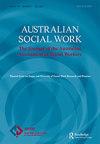在澳大利亚做土著父亲最好的事情是什么?
IF 2
3区 社会学
Q2 SOCIAL WORK
引用次数: 1
摘要
摘要在澳大利亚,定居者殖民主义的持续结构意味着对愤怒的理解继续支持对土著人民生活的不足叙事。土著父亲的主要叙事往往是功能失调、离经叛道和脱离孩子的标签。利用土著儿童的纵向研究数据,本文试图挑战这些缺陷叙事,不仅揭示土著父亲报告的父亲经历的优势,还揭示在土著认识论下如何重新定义父亲身份。我们遵循了最近的努力,在土著父亲研究中使用了一种基于优势的方法,以对抗土著父亲身份的不足叙事,并探索土著观点如何为社会、文化、健康和福祉实践的方法提供信息。我们对“做孩子的父亲最棒的事情是什么?”这个问题的答案进行了内容分析。一系列的回答表明,土著父亲报告说,与孩子分享爱和文化是对孩子坚强成长的直接贡献。研究结果强调了基于优势的方法在挑战原住民或托雷斯海峡岛民父亲或两者的不公平和不准确的基于赤字的叙述方面的重要作用。这篇文章指出,土著或托雷斯海峡岛民父亲或两者的基于赤字的叙述的影响是社会工作实践需要解决的一个紧迫问题,因为这种叙述可能会导致过高的儿童迁移率。本文章由计算机程序翻译,如有差异,请以英文原文为准。
What Is the Best Thing About Being an Indigenous Father in Australia?
ABSTRACT In Australia, the ongoing structure of settler colonialism has meant understandings of Indigeneity continue to uphold deficit narratives about the lives of Indigenous peoples. The narrative that predominates for Indigenous fathers is often the labels of dysfunctionality, deviance, and disengagement from their children. Using the Longitudinal Study of Indigenous Children data, this article seeks to challenge these deficit narratives to shed light not only on the strengths Indigenous fathers report of their experiences of fatherhood, but also on how fatherhood could be reconceptualised under an Indigenous epistemology. We followed recent efforts and used a strengths-based approach in Indigenous fathering research to counter deficit narratives of Indigenous fatherhood and explore how an Indigenous standpoint can inform approaches to social, cultural, and health and wellbeing practices. We applied a content analysis to answers generated by the question “What is the best thing about being your child's father?” The range of responses suggested a most positive and child-centred experience of fatherhood where Indigenous fathers report the sharing of love and culture with their children as direct contributions to children growing up strong. IMPLICATIONS The findings highlight the significant role of a strengths-based approach focused on relationality to challenge unfair and inaccurate deficit-based narratives of Aboriginal or Torres Strait Islander fathers or both. The article identifies the influence of deficit-based narratives of Aboriginal or Torres Strait Islander fathers or both as an urgent issue for social work practice to address as such narratives may be implicated in contributing to excessively high rates of child removal.
求助全文
通过发布文献求助,成功后即可免费获取论文全文。
去求助
来源期刊

Australian Social Work
SOCIAL WORK-
CiteScore
4.20
自引率
16.70%
发文量
37
期刊介绍:
Australian Social Work is an international peer-reviewed journal reflecting current thinking and trends in Social Work. The Journal promotes the development of practice, policy and education, and publishes original research, theoretical papers and critical reviews that build on existing knowledge. The Journal also publishes reviews of relevant professional literature, commentary and analysis of social policies and encourages debate in the form of reader commentary on articles. Australian Social Work has grown out of the Australian context and continues to provide a vehicle for Australian and international authors. The Journal invites submission of papers from authors worldwide and all contributors are encouraged to present their work for an international readership.
 求助内容:
求助内容: 应助结果提醒方式:
应助结果提醒方式:


